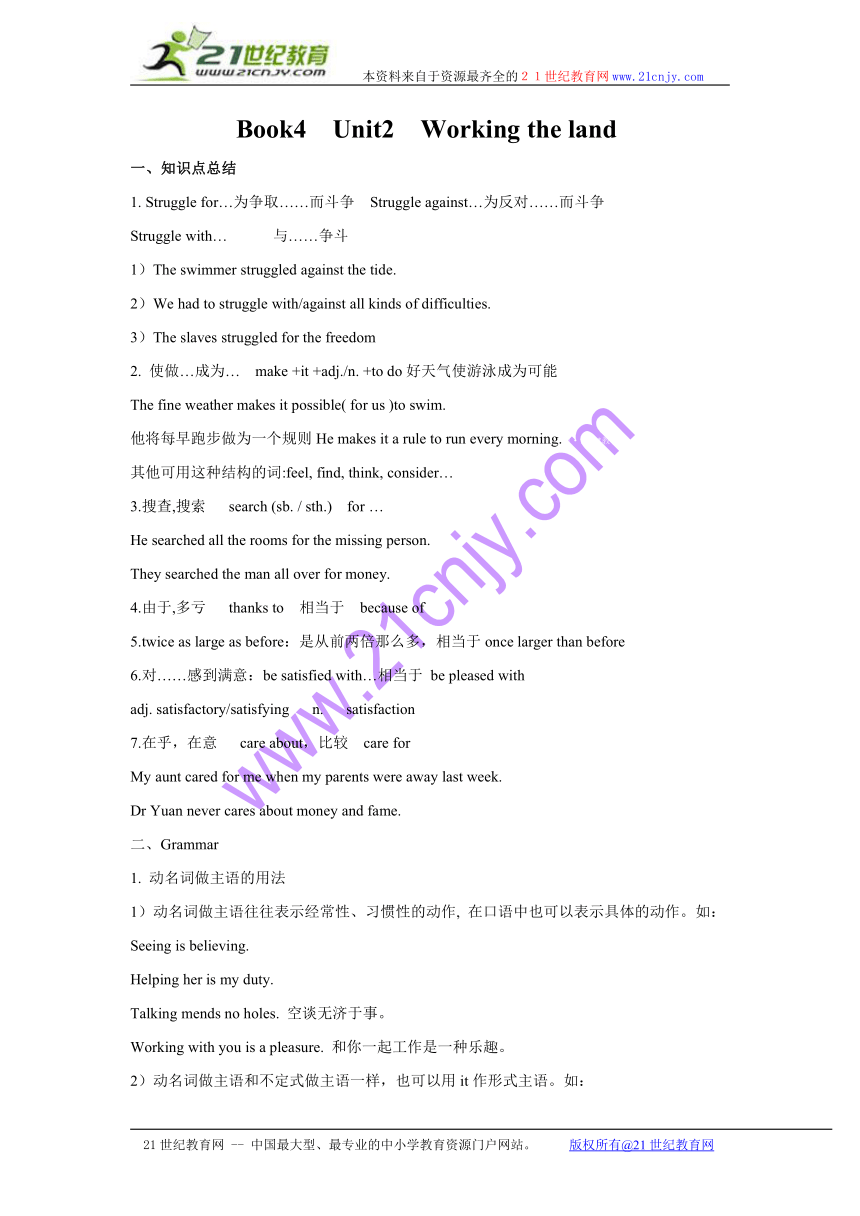人教课标版高中英语(教案)Book4 Unit2 Working the land
文档属性
| 名称 | 人教课标版高中英语(教案)Book4 Unit2 Working the land |

|
|
| 格式 | zip | ||
| 文件大小 | 12.8KB | ||
| 资源类型 | 教案 | ||
| 版本资源 | 人教版(新课程标准) | ||
| 科目 | 英语 | ||
| 更新时间 | 2016-08-11 00:00:00 | ||
图片预览

文档简介
本资料来自于资源最齐全的21世纪教育网www.21cnjy.com
Book4
Unit2
Working
the
land
一、知识点总结
1.
Struggle
for…为争取……而斗争
Struggle
against…为反对……而斗争
Struggle
with…
与……争斗
1)The
swimmer
struggled
against
the
tide.
2)We
had
to
struggle
with/against
all
kinds
of
difficulties. 21
cnjy
com
3)The
slaves
struggled
for
the
freedom
2.
使做…成为…
make
+it
+adj./n.
+to
do好天气使游泳成为可能
The
fine
weather
makes
it
possible(
for
us
)to
swim.21cnjy.com
他将每早跑步做为一个规则He
makes
it
a
rule
to
run
every
morning.21·世纪
教育网
其他可用这种结构的词:feel,
find,
think,
consider…
3.搜查,搜索
search
(sb.
/
sth.)
for
…
He
searched
all
the
rooms
for
the
missing
person.
They
searched
the
man
all
over
for
money.
4.由于,多亏
thanks
to
相当于
because
of
5.twice
as
large
as
before:是从前两倍那么多,相当于once
larger
than
before
6.对……感到满意:be
satisfied
with…相当于
be
pleased
with
adj.
satisfactory/satisfying
n.
satisfaction
7.在乎,在意
care
about,比较
care
for
My
aunt
cared
for
me
when
my
parents
were
away
last
week.21教育网
Dr
Yuan
never
cares
about
money
and
fame.
二、Grammar
1.
动名词做主语的用法
1)动名词做主语往往表示经常性、习惯性的动作,
在口语中也可以表示具体的动作。如:
Seeing
is
believing.
Helping
her
is
my
duty.
Talking
mends
no
holes.
空谈无济于事。
Working
with
you
is
a
pleasure.
和你一起工作是一种乐趣。
2)动名词做主语和不定式做主语一样,也可以用it作形式主语。如:
It's
rather
tiring
walking
around
in
a
city.
3)不定式做主语往往表示具体的特别是将来的动作。如:
It's
no
use
crying
over
spilt
milk.覆水难收。
He
realized
that
to
go
on
like
this
was
wrong.
2.
动名词作宾语的用法
1)有些动词或短语动词后常用动名词作宾语
( http: / / www.21cnjy.com )。如admit,
appreciate,
avoid,can't
stand(不能忍受),
consider,delay,
devote
…
to,
dislike
enjoy,escape,
excuse,
feel
like,
finish,
forgive,
get
down
to,
give
up,21·cn·jy·com
imagine.
insist
on,
k
( http: / / www.21cnjy.com )eep
(on),
look
forward
to,
mention,
mind,
miss(错过),
pay
attention
to,
practice,
put
off,
stick
to,
suggest等等。
www.21-cn-jy.com
Doing
morning
exercises
is
good
for
your
health.
做早操对你的健康有好处。
Her
shoes
wants
mending.
她的鞋该修理了。
注意:
当
need,
want,
require,
worth后面接doing也可以表示被动。
Your
hair
wants
cutting. 你的头发该理了。
The
floor
requires
washing.
地板需要冲洗。2·1·c·n·j·y
I
have
finished
writing
this
book.我已经写完这本书了。
2)在allow,
advise,
for
( http: / / www.21cnjy.com )bid,
permit后直接跟动名词作宾语,如果有名词或代词作宾语,则构成“allow/advise/forbid/permit
+名词/代词+不定式(宾语补足语)”之形式。如:
We
don't
allow
smoking
here.
We
don't
allow
anybody
to
smoke
here.
3)动词need,
require,
want意为“需要”时,后跟动名词的主动式或不定式的被动式作宾语,意义没有区别。如:
【来源:21·世纪·教育·网】
The
window
needs/requires/wants
cleaning/to
be
cleaned.
21世纪教育网版权所有
4)在begin,
con
( http: / / www.21cnjy.com )tinue,
love,
like,
hate,
prefer,
intend,
start后用动名词和用不定式作宾语均可,意义没有多大区别。
www-2-1-cnjy-com
5)动词forget,
go
on,
( http: / / www.21cnjy.com )mean,
regret,
remember,
stop,
try,
be
used
to,
can't
help后跟动名词和跟不定式区别较大,须注意;forget,
regret,
remember后跟动名词,动名词表示已经发生的动作;后跟不定式表示将要发生的动作。
2-1-c-n-j-y
21世纪教育网
--
中国最大型、最专业的中小学教育资源门户网站。
版权所有@21世纪教育网
Book4
Unit2
Working
the
land
一、知识点总结
1.
Struggle
for…为争取……而斗争
Struggle
against…为反对……而斗争
Struggle
with…
与……争斗
1)The
swimmer
struggled
against
the
tide.
2)We
had
to
struggle
with/against
all
kinds
of
difficulties. 21
cnjy
com
3)The
slaves
struggled
for
the
freedom
2.
使做…成为…
make
+it
+adj./n.
+to
do好天气使游泳成为可能
The
fine
weather
makes
it
possible(
for
us
)to
swim.21cnjy.com
他将每早跑步做为一个规则He
makes
it
a
rule
to
run
every
morning.21·世纪
教育网
其他可用这种结构的词:feel,
find,
think,
consider…
3.搜查,搜索
search
(sb.
/
sth.)
for
…
He
searched
all
the
rooms
for
the
missing
person.
They
searched
the
man
all
over
for
money.
4.由于,多亏
thanks
to
相当于
because
of
5.twice
as
large
as
before:是从前两倍那么多,相当于once
larger
than
before
6.对……感到满意:be
satisfied
with…相当于
be
pleased
with
adj.
satisfactory/satisfying
n.
satisfaction
7.在乎,在意
care
about,比较
care
for
My
aunt
cared
for
me
when
my
parents
were
away
last
week.21教育网
Dr
Yuan
never
cares
about
money
and
fame.
二、Grammar
1.
动名词做主语的用法
1)动名词做主语往往表示经常性、习惯性的动作,
在口语中也可以表示具体的动作。如:
Seeing
is
believing.
Helping
her
is
my
duty.
Talking
mends
no
holes.
空谈无济于事。
Working
with
you
is
a
pleasure.
和你一起工作是一种乐趣。
2)动名词做主语和不定式做主语一样,也可以用it作形式主语。如:
It's
rather
tiring
walking
around
in
a
city.
3)不定式做主语往往表示具体的特别是将来的动作。如:
It's
no
use
crying
over
spilt
milk.覆水难收。
He
realized
that
to
go
on
like
this
was
wrong.
2.
动名词作宾语的用法
1)有些动词或短语动词后常用动名词作宾语
( http: / / www.21cnjy.com )。如admit,
appreciate,
avoid,can't
stand(不能忍受),
consider,delay,
devote
…
to,
dislike
enjoy,escape,
excuse,
feel
like,
finish,
forgive,
get
down
to,
give
up,21·cn·jy·com
imagine.
insist
on,
k
( http: / / www.21cnjy.com )eep
(on),
look
forward
to,
mention,
mind,
miss(错过),
pay
attention
to,
practice,
put
off,
stick
to,
suggest等等。
www.21-cn-jy.com
Doing
morning
exercises
is
good
for
your
health.
做早操对你的健康有好处。
Her
shoes
wants
mending.
她的鞋该修理了。
注意:
当
need,
want,
require,
worth后面接doing也可以表示被动。
Your
hair
wants
cutting. 你的头发该理了。
The
floor
requires
washing.
地板需要冲洗。2·1·c·n·j·y
I
have
finished
writing
this
book.我已经写完这本书了。
2)在allow,
advise,
for
( http: / / www.21cnjy.com )bid,
permit后直接跟动名词作宾语,如果有名词或代词作宾语,则构成“allow/advise/forbid/permit
+名词/代词+不定式(宾语补足语)”之形式。如:
We
don't
allow
smoking
here.
We
don't
allow
anybody
to
smoke
here.
3)动词need,
require,
want意为“需要”时,后跟动名词的主动式或不定式的被动式作宾语,意义没有区别。如:
【来源:21·世纪·教育·网】
The
window
needs/requires/wants
cleaning/to
be
cleaned.
21世纪教育网版权所有
4)在begin,
con
( http: / / www.21cnjy.com )tinue,
love,
like,
hate,
prefer,
intend,
start后用动名词和用不定式作宾语均可,意义没有多大区别。
www-2-1-cnjy-com
5)动词forget,
go
on,
( http: / / www.21cnjy.com )mean,
regret,
remember,
stop,
try,
be
used
to,
can't
help后跟动名词和跟不定式区别较大,须注意;forget,
regret,
remember后跟动名词,动名词表示已经发生的动作;后跟不定式表示将要发生的动作。
2-1-c-n-j-y
21世纪教育网
--
中国最大型、最专业的中小学教育资源门户网站。
版权所有@21世纪教育网
同课章节目录
